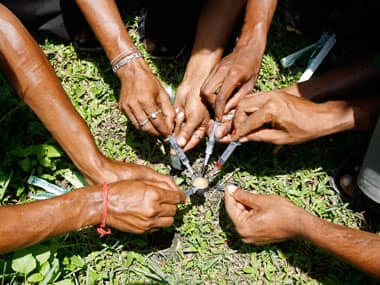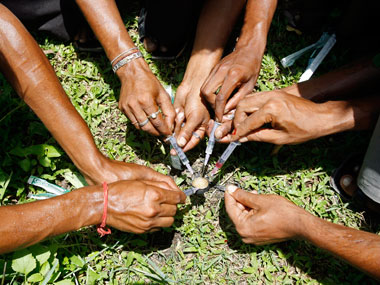In popular imagination reinforced by Bollywood stereotypes, a typical Punjab village is a yellow-green stretch of mustard fields where muscular youth do the bhangra after endless rounds of lassi while the women sing Punjabi tappe in the background. But, the real Punjab is a cruel caricature of its reel avatar. [caption id=“attachment_2564528” align=“alignleft” width=“380”]  On self-destruct path. Reuters[/caption] These days, the men — called amlis because of their drug addiction — are more likely to be found either lolling around in a dazed stupor, selling their blood to buy dope or begging in the streets for one desperate ‘hit’. A lucky few end up in time at de-addiction centres, others wait for their tragic end hastened by the deadly concoctions singing in their veins. As former finance minister Manpreet Badal wrote in The Tribune a few years ago, the famous gabru jawan of yore today fails to clear police and army physical recruitment tests, shuns work in his own fields, is averse to any physical activity and is dying an untimely death. No, Punjab’s men are nowhere close to the image conjured by Yash Chopra’s DDLJ or Veer-Zara. They are more like the ill-fated youth in Danny Boyle’s Trainspotting. An uncertain future Concerns about the future of these men is most likely to decide the outcome of the next election in Punjab, scheduled in about a year’s time. When people turn out to vote in Punjab’s Vidhan Sabha polls, they would have just two things on their mind: one, how to deal with the Badals of Akali Dal and, two, how to get its youth off bhooki (poppy husk) and back to lassi. And politicians are listening. Earlier this week, when former chief minister Captain Amarinder Singh held a rally in Bathinda — the pocketborough of the Akalis — he set the tone of the campaign with a dramatic act. Pressing a gutka (holy book) to his forehead, Singh vowed to wipe out the drug menace within four weeks of a Congress win. When Singh made this promise, he was merely echoing the tone set by the AAP party in the 2014 Lok Sabha. In the general elections, Arvind Kejriwal’s fledgling party had stunned everyone by winning four Lok Sabha seats in Punjab, primarily on the basis of its vow to address the drug menace. The party’s popular slogan, ‘Na bhooki (poppy husk) ko, na daaru (liquor) ko, vote denge jhaadu ko,’ is still resonating through Punjab. But this time the Congress too has joined the chorus. In October 2012, during a visit to Punjab, Congress leader Rahul Gandhi had argued that more than 70 percent of Punjab’s youngsters are addicted to drugs. As was the fashion then, his statement was ridiculed by his opponents and critics. But, Gandhi had got the pulse of Punjab right, if not the statistics. Though the state government has not conducted a comprehensive study of the impact of drugs on Punjab’s population, some surveys suggest that at least half of Punjab’s population in the 16-35 age group is addicted. According to a report in the Outlook, a study by Dr Ravinder Sandhu of Guru Nanak Dev University put the incidence of dope-related crimes in Punjab at nine times the national average. Between 1999 and 2008 (the years when Punjab was recovering from the aftermath of terrorism), such crimes registered a staggering 245 percent increase. Punjab became the state with the highest number of narcotics-related crimes, surpassing Mizoram which earlier held this dubious distinction. Another study by the department of Social Security Development of Women and Children found that 67 percent households in Punjab have at least one person addicted to drugs. Yet another study by the Narcotics Bureau discovered that nearly 40 percent men in Punjab are hooked to drugs. Anecdotal evidence also points at a growing culture of drug abuse. Former DGP of Punjab, Shashi Kant, has been a relentless crusader against the problem of drugs and the cartels that pump this poison into Punjab. “A variety of deadly intoxicants are landing in Punjab from all across the world. Pharmaceutical drugs being sold over the counter without prescription are being mixed with deadly effect. Opiates are coming from several parts of north and central India, heroin and cocaine are easily available. The rich and the elite have taken to synthetic drugs,” he says. The former top cop says a major portion of drugs being produced and dumped in India is being consumed in Punjab. Nirmal Singh, 65, a resident of Maqdoompur in Amritsar narrates disturbing tales of addiction and suffering in Punjab’s hinterland, towns and cities. “Humari nasl barbad ho gayee hai, patan ho gaya hai logon ka nasha kar kar ke, (Our people have destroyed themselves, they have fallen from grace because of drug addiction),” he laments. Maqdoompur, once known as the rice bowl of India, is now called the “widow village” of Punjab since almost every household in the village has lost at least one member to drug addiction. “Sirf manhoosi aur udasi hai hamare yahan, koi umeed nahin (we have just sorrow and grief, no hope),” he says. Grief is writ in bold on the visage of women like Navneet Kaur, 41, of Maqdoompur who lost her husband to drugs a year ago. Her husband first got hooked to opium and then graduated to heroine. When the family stopped giving him money, he started selling his blood to buy drugs. “One day, he was caught by the blood bank staff who noticed his pale face, dark eyes and hundreds of syringe marks on his arm. So, we put him into an addiction centre where they tried methadone therapy on him. But he ran away and ultimately died of a deadly cocktail of pharmaceutical drugs,” Kaur says. This is the story of almost every household in rural Punjab. A troubled past Former cop Shashi Kant says Punjab was always prone to addiction. “Punjab became the transit route for drugs sometime around 300 BC. Since it fell on the Silk Route, like all other merchandise, opiates also landed first in Punjab,” he says. Many other factors contributed to their proliferation, Shashi Kant says. “When the invaders came from Central Asia, they brought large population of people addicted to opium. Later, when militancy gained ground, terrorists attacked liquor shops and drinkers, so injecting drugs bought illegally became safer,” he explains. Soon, the number of addicts became so big that dealing in drugs became a lucrative business. In 2007, the intelligence department had compiled a four-page list of the drug barons of Punjab. This list had names of powerful politicians from every political party and police officials at every level. For some mysterious reason, the list has disappeared from official records. The 2017 Vidhan Sabha elections could be a decisive moment in Punjab’s struggle with drugs. Ten years of SAD-BJP rule has convinced voters that it would be fatuous to expect a solution till the Badals are in power. There is growing conviction within the state that Punjab’s first family will never disturb the cartels responsible for running drugs in the state. Though the Congress under Captain Amarinder Singh has vowed to deal with the promise, its pledge is seen with a lot of scepticism because of its failure in the past. Though the Akalis are rarely taken seriously these days, not many disagree when their leaders say the roots of the problem lie in the post-militancy era, when the Congress was in power. Kejriwal’s AAP could benefit from this distrust of the established parties and desperation for a solution, provided the party is able to rise above theatrics, slogans, vacuous dialogues, bickering and write a new script that imagines Punjab as the lush-green land of bhangra and tappe, not of the wails of drug widows.
A study by the department of Social Security Development of Women and Children found that 67 percent households in Punjab have at least one person addicted to drugs.
Advertisement
End of Article


)
)
)
)
)
)
)
)
)



